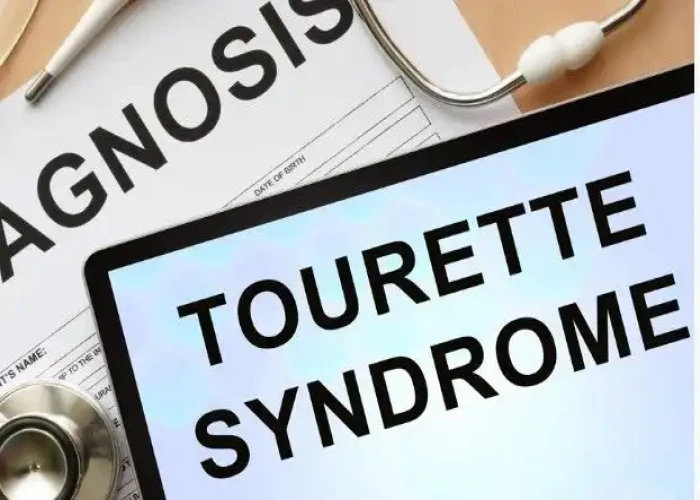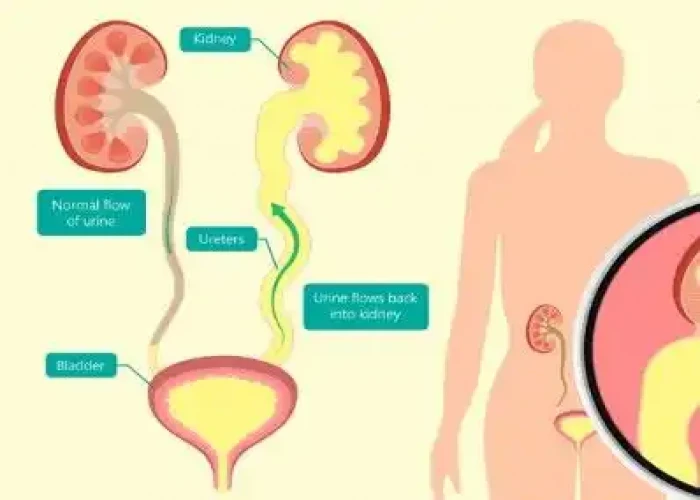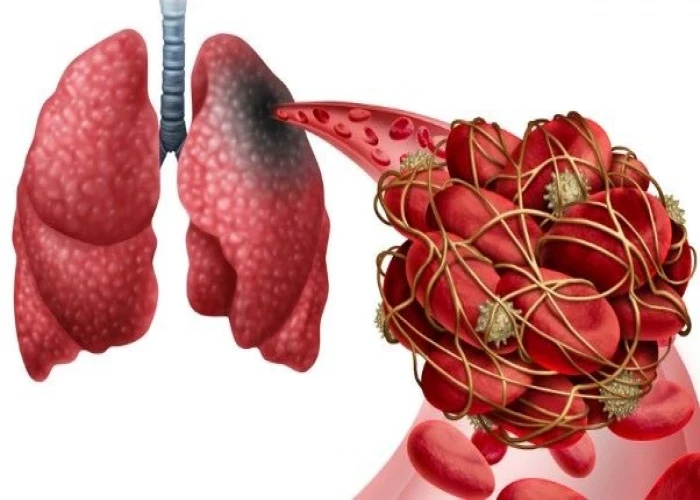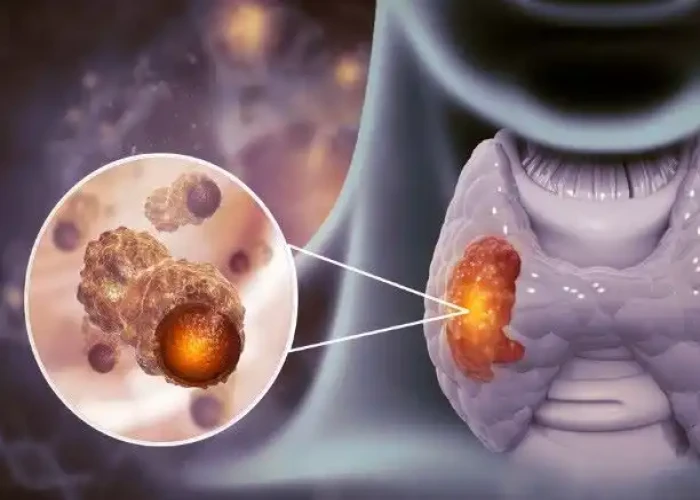 Welcome
Welcome
“May all be happy, may all be healed, may all be at peace and may no one ever suffer."
Thyroid cancer

Thyroid cancer is a type of cancer that develops in the thyroid gland, which is located in the neck and produces hormones that regulate the body's metabolism. Thyroid cancer is relatively rare, but its incidence has been increasing in recent years.
The exact cause of thyroid cancer is not known, but it is believed to be related to genetic factors and exposure to radiation. Women are more likely to develop thyroid cancer than men.
There are several types of thyroid cancer, including papillary thyroid cancer, follicular thyroid cancer, medullary thyroid cancer, and anaplastic thyroid cancer. Papillary and follicular thyroid cancers are the most common types and are usually highly treatable.
Symptoms of thyroid cancer may include a lump or nodule in the neck, difficulty swallowing, hoarseness, enlarged lymph nodes in the neck, and pain in the neck or throat.
Diagnosis of thyroid cancer typically involves a physical examination, imaging tests such as an ultrasound or CT scan, and a biopsy to confirm the presence of cancer cells.
Treatment for thyroid cancer may involve surgery to remove the thyroid gland, followed by radiation therapy and/or chemotherapy. In some cases, radioactive iodine therapy may also be used to destroy any remaining thyroid tissue or cancer cells.
The prognosis for thyroid cancer depends on the type and stage of the cancer at the time of diagnosis. With early detection and treatment, most cases of thyroid cancer can be successfully treated.
Research Papers
Disease Signs and Symptoms
- Swollen lump or skin nodules
- Neck lump
- Neck pain
- Hoarseness
- Difficulty swallowing (dysphagia)
- Throat pain
- Throat lump
- Swollen lymph nodes
Disease Causes
Thyroid cancer
It's not clear what causes thyroid cancer.
Thyroid cancer occurs when cells in your thyroid undergo genetic changes (mutations). The mutations allow the cells to grow and multiply rapidly. The cells also lose the ability to die, as normal cells would. The accumulating abnormal thyroid cells form a tumor. The abnormal cells can invade nearby tissue and can spread (metastasize) to other parts of the body.
Types of thyroid cancer
Thyroid cancer is classified into types based on the kinds of cells found in the tumor. Your type is determined when a sample of tissue from your cancer is examined under a microscope. The type of thyroid cancer is considered in determining your treatment and prognosis.
Types of thyroid cancer include:
- Papillary thyroid cancer. The most common form of thyroid cancer, papillary thyroid cancer arises from follicular cells, which produce and store thyroid hormones. Papillary thyroid cancer can occur at any age, but most often it affects people ages 30 to 50. Doctors sometimes refer to papillary thyroid cancer and follicular thyroid cancer together as differentiated thyroid cancer.
- Follicular thyroid cancer. Follicular thyroid cancer also arises from the follicular cells of the thyroid. It usually affects people older than age 50. Hurthle cell cancer is a rare and potentially more aggressive type of follicular thyroid cancer.
- Anaplastic thyroid cancer. Anaplastic thyroid cancer is a rare type of thyroid cancer that begins in the follicular cells. It grows rapidly and is very difficult to treat. Anaplastic thyroid cancer typically occurs in adults age 60 and older.
- Medullary thyroid cancer. Medullary thyroid cancer begins in thyroid cells called C cells, which produce the hormone calcitonin. Elevated levels of calcitonin in the blood can indicate medullary thyroid cancer at a very early stage. Certain genetic syndromes increase the risk of medullary thyroid cancer, although this genetic link is uncommon.
- Other rare types. Other very rare types of cancer that start in the thyroid include thyroid lymphoma, which begins in the immune system cells of the thyroid, and thyroid sarcoma, which begins in the connective tissue cells of the thyroid.
Disease Prevents
Thyroid cancer
Doctors aren't sure what causes most cases of thyroid cancer, so there's no way to prevent thyroid cancer in people who have an average risk of the disease.
Prevention for people with a high risk
Adults and children with an inherited gene mutation that increases the risk of medullary thyroid cancer may consider thyroid surgery to prevent cancer (prophylactic thyroidectomy). Discuss your options with a genetic counselor who can explain your risk of thyroid cancer and your treatment options.
Prevention for people near nuclear power plants
A medication that blocks the effects of radiation on the thyroid is sometimes provided to people living near nuclear power plants. The medication (potassium iodide) could be used in the unlikely event of a nuclear reactor accident. If you live within 10 miles of a nuclear power plant and are concerned about safety precautions, contact your state or local emergency management department for more information.
Disease Treatments
Your thyroid cancer treatment options depend on the type and stage of your thyroid cancer, your overall health, and your preferences.
Most thyroid cancers can be cured with treatment.
Treatment may not be needed right away
Very small thyroid cancers that have a low risk of spreading in the body might not need treatment right away. Instead, you might consider active surveillance with frequent monitoring of the cancer. Your doctor might recommend blood tests and an ultrasound exam of your neck once or twice per year.
In some people, the cancer might never grow and never require treatment. In others, growth may eventually be detected and treatment can be initiated.
Surgery
Most people with thyroid cancer undergo surgery to remove the thyroid. Which operation your doctor might recommend depends on the type of thyroid cancer, the size of the cancer, whether the cancer has spread beyond the thyroid and the results of an ultrasound exam of the entire thyroid gland.
Operations used to treat thyroid cancer include:
- Removing all or most of the thyroid (thyroidectomy). An operation to remove the thyroid gland might involve removing all of the thyroid tissue (total thyroidectomy) or most of the thyroid tissue (near-total thyroidectomy). The surgeon often leaves small rims of thyroid tissue around the parathyroid glands to reduce the risk of damage to the parathyroid glands, which help regulate the calcium levels in your blood.
- Removing a portion of the thyroid (thyroid lobectomy). During a thyroid lobectomy, the surgeon removes half of the thyroid. It might be recommended if you have a slow-growing thyroid cancer in one part of the thyroid and no suspicious nodules in other areas of the thyroid.
- Removing lymph nodes in the neck (lymph node dissection). When removing your thyroid, the surgeon may also remove nearby lymph nodes in the neck. These can be tested for signs of cancer.
Thyroid surgery carries a risk of bleeding and infection. Damage to your parathyroid glands also can occur during surgery, which can lead to low calcium levels in your body.
There's also a risk that the nerves connected to your vocal cords might not work normally after surgery, which can cause vocal cord paralysis, hoarseness, voice changes or difficulty breathing. Treatment can improve or reverse nerve problems.
Thyroid hormone therapy
After thyroidectomy, you may take the thyroid hormone medication levothyroxine (Levoxyl, Synthroid, others) for life.
This medication has two benefits: It supplies the missing hormone your thyroid would normally produce, and it suppresses the production of thyroid-stimulating hormone (TSH) from your pituitary gland. High TSH levels could conceivably stimulate any remaining cancer cells to grow.
Radioactive iodine
Radioactive iodine treatment uses large doses of a form of iodine that's radioactive.
Radioactive iodine treatment is often used after thyroidectomy to destroy any remaining healthy thyroid tissue, as well as microscopic areas of thyroid cancer that weren't removed during surgery. Radioactive iodine treatment may also be used to treat thyroid cancer that recurs after treatment or that spreads to other areas of the body.
Radioactive iodine treatment comes as a capsule or liquid that you swallow. The radioactive iodine is taken up primarily by thyroid cells and thyroid cancer cells, so there's a low risk of harming other cells in your body.
Side effects may include:
- Dry mouth
- Mouth pain
- Eye inflammation
- Altered sense of taste or smell
- Fatigue
Most of the radioactive iodine leaves your body in your urine in the first few days after treatment. You'll be given instructions for precautions you need to take during that time to protect other people from the radiation. For instance, you may be asked to temporarily avoid close contact with other people, especially children and pregnant women.
External radiation therapy
Radiation therapy can also be given externally using a machine that aims high-energy beams, such as X-rays and protons, at precise points on your body (external beam radiation therapy). During treatment, you lie still on a table while a machine moves around you.
External beam radiation therapy may be recommended if surgery isn't an option and your cancer continues to grow after radioactive iodine treatment. Radiation therapy may also be recommended after surgery if there's an increased risk that your cancer will recur.
Chemotherapy
Chemotherapy is a drug treatment that uses chemicals to kill cancer cells. Chemotherapy is typically given as an infusion through a vein. The chemicals travel throughout your body, killing quickly growing cells, including cancer cells.
Chemotherapy isn't commonly used in the treatment of thyroid cancer, but it's sometimes recommended for people with anaplastic thyroid cancer. Chemotherapy may be combined with radiation therapy.
Targeted drug therapy
Targeted drug treatments focus on specific abnormalities present within cancer cells. By blocking these abnormalities, targeted drug treatments can cause cancer cells to die.
Targeted drug therapy for thyroid cancer targets the signals that tell cancer cells to grow and divide. It's typically used in advanced thyroid cancer.
Injecting alcohol into cancers
Alcohol ablation involves injecting small thyroid cancers with alcohol using imaging such as ultrasound to ensure precise placement of the injection. This procedure causes thyroid cancers to shrink.
Alcohol ablation might be an option if your cancer is very small and surgery isn't an option. It's also sometimes used to treat cancer that recurs in the lymph nodes after surgery.
Supportive (palliative) care
Palliative care is specialized medical care that focuses on providing relief from pain and other symptoms of a serious illness. Palliative care specialists work with you, your family and your other doctors to provide an extra layer of support that complements your ongoing care.
Palliative care can be used while undergoing other aggressive treatments, such as surgery, chemotherapy or radiation therapy. Increasingly, it's being offered early in the course of cancer treatment.
When palliative care is used along with all of the other appropriate treatments, people with cancer may feel better and live longer.
Palliative care is provided by a team of doctors, nurses and other specially trained professionals. Palliative care teams aim to improve quality of life for people with cancer and their families.
Disease Diagnoses
Disease Allopathic Generics
Disease Ayurvedic Generics
Disease Homeopathic Generics
Disease yoga
Thyroid cancer and Learn More about Diseases

Kawasaki disease

Anterior prolapse (cystocele)

Tourette syndrome

Broken collarbone

Vesicoureteral reflux

Toxic hepatitis

Pet allergy

Pulmonary embolism
thyroid cancer, থাইরয়েড ক্যান্সার
To be happy, beautiful, healthy, wealthy, hale and long-lived stay with DM3S.
